
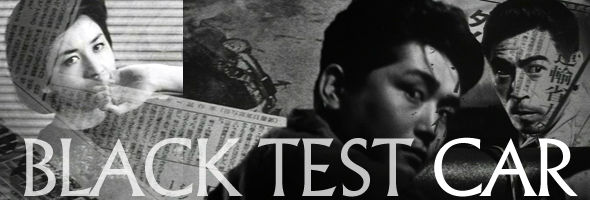
BLACK TEST CAR
B&W, 1962, 94 mins. 35 secs.
Directed by Yasuzô Masumura
Starring Jirô Tamiya, Junko Kanô, Eiji Funakoshi, Hideo Takamatsu
Arrow Video (Blu-ray) (US/UK RA/RB HD), Fantoma (US R1 NTSC) / WS (2.35:1) (16:9)
THE BLACK REPORT
B&W, 1963, 92 mins. 14 secs.
Directed by Yasuzô Masumura
Starring Ken Utsui, Junko Kanô, Hideo Takamatsu
Arrow Video (Blu-ray) (US/UK RA/RB HD) / WS (2.35:1) (16:9)
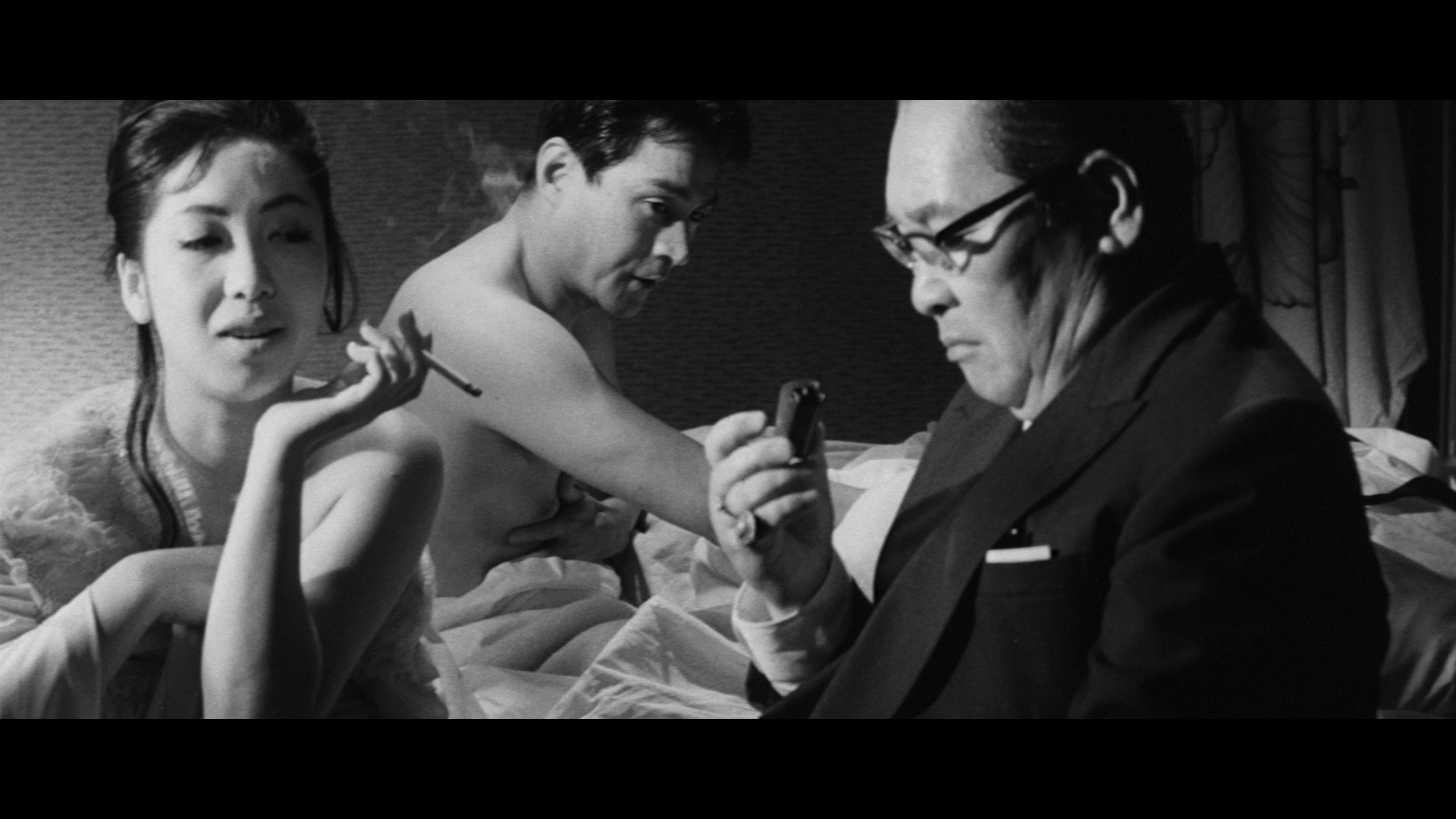 to the DVD era, English-speaking audiences with a taste for the adventurous have become familiar with the work
to the DVD era, English-speaking audiences with a taste for the adventurous have become familiar with the work  of genre-hopping director Yasuzo Masamura, with titles like Manji, Afraid to Die, and his horror masterpiece Blind Beast turning a few heads in the '00s. After his playful 1958 gem Giants and Toys, Masumura returned to the boardrooms again in the '60s for a much darker take on capitalism run amuck with Black Test Car for the studio Daiei. Not surprisingly, this tale of two warring auto companies trying to outdo each other in the quest for the brass ring hasn't dated much over the decades, and in fact its morally bankrupt universe looks almost quaint in today's world.
of genre-hopping director Yasuzo Masamura, with titles like Manji, Afraid to Die, and his horror masterpiece Blind Beast turning a few heads in the '00s. After his playful 1958 gem Giants and Toys, Masumura returned to the boardrooms again in the '60s for a much darker take on capitalism run amuck with Black Test Car for the studio Daiei. Not surprisingly, this tale of two warring auto companies trying to outdo each other in the quest for the brass ring hasn't dated much over the decades, and in fact its morally bankrupt universe looks almost quaint in today's world.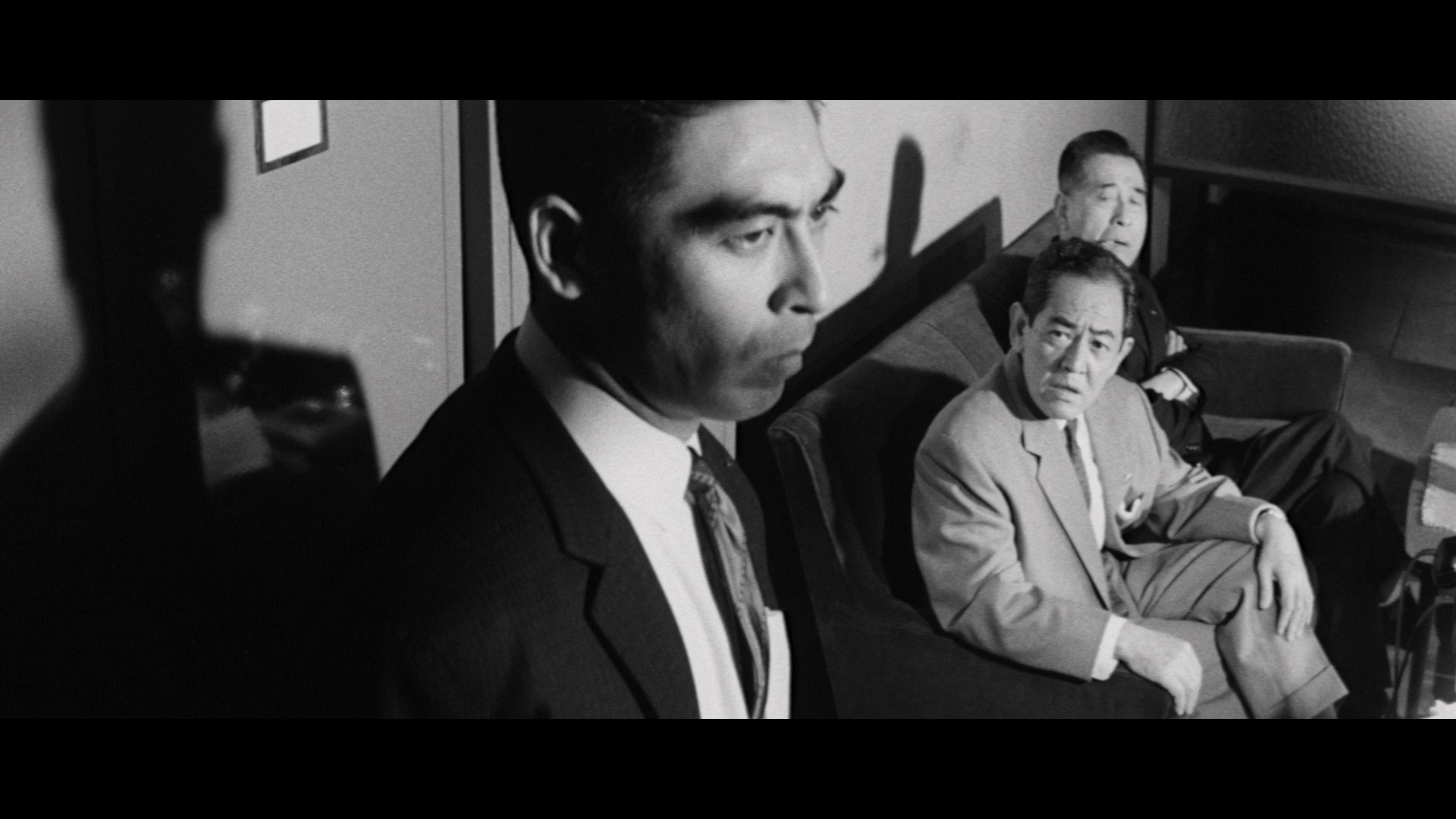 goals at any cost.
goals at any cost. 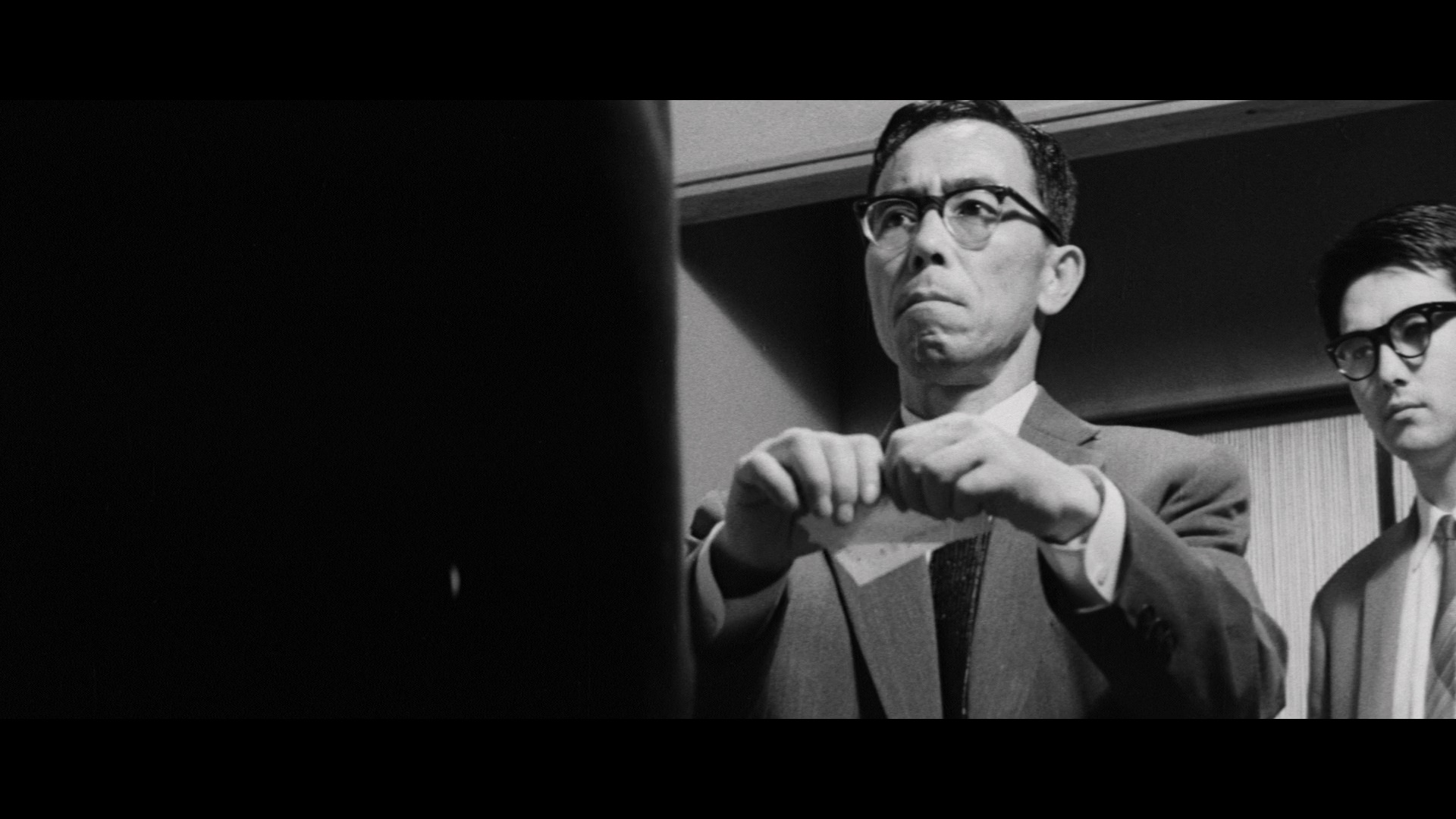
 dramatic theatrical trailer.
dramatic theatrical trailer.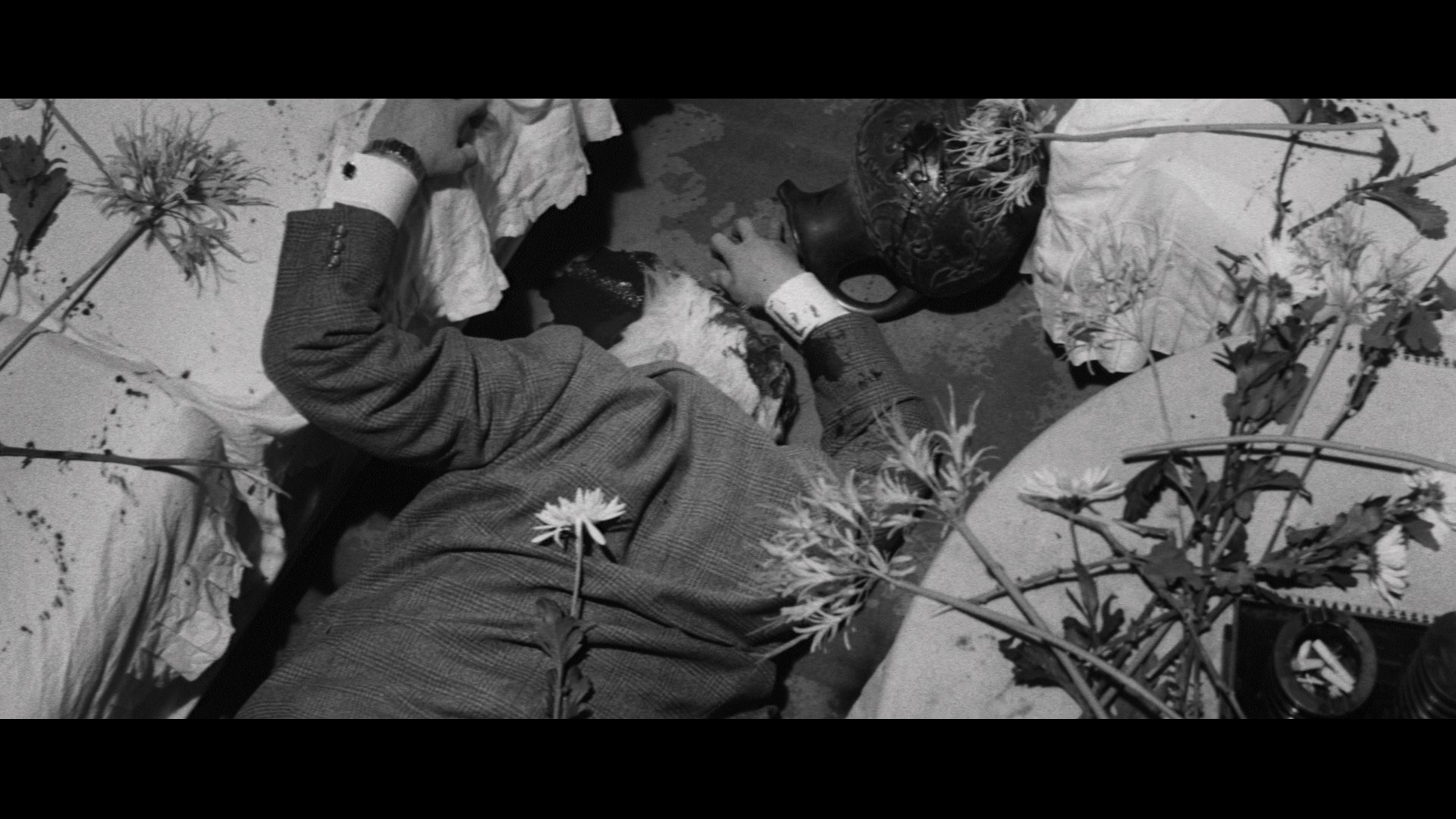 In 2020, Arrow Video upgraded it to Blu-ray with a transfer that makes for a welcome upgrade on the already excellent SD option; framing is similar with just a tad more info here, black levels are deepened a notch, and detail increases appreciably, especially in close ups. The LPCM Japanese 1.0 mono track sounds very good and comes with optional English subtitles. Sharing space on the disc is a second feature made as part of the "black"-titled films in its wake, the following year's The Black Report (a.k.a. The Black Statement Book), a crime procedural that brings back some of the key players here. We begin with a murder scene as an elderly "money-mad womanizer" man, the President of Fujiyama Foods, lies face down on the floor, his head bloodily bashed in with a vase of flowers. Cigarette butts indicate the presence of three people in the room (including at least one woman), with the son of the deceased, a theater director, having found the body. The late man's unfaithful second wife, Miyuki, resides in the house along with the maid, and faced with a barrage of evidence (including multiple fingerprints, lipstick, and two fresh types of flowers at the scene), the prosecutor, Kido (Utsui), must mount a murder case that leads to a revelatory courtroom trial. Complicating matters is the dead man's mistress, Ayako (Kanô again), who's gunning for the death penalty. Like the prior film, this has a low-key undercurrent of unease and paranoia created by Masumura's visual sensibilities including shifting characters off center and blocking off huge portions of the frame to
In 2020, Arrow Video upgraded it to Blu-ray with a transfer that makes for a welcome upgrade on the already excellent SD option; framing is similar with just a tad more info here, black levels are deepened a notch, and detail increases appreciably, especially in close ups. The LPCM Japanese 1.0 mono track sounds very good and comes with optional English subtitles. Sharing space on the disc is a second feature made as part of the "black"-titled films in its wake, the following year's The Black Report (a.k.a. The Black Statement Book), a crime procedural that brings back some of the key players here. We begin with a murder scene as an elderly "money-mad womanizer" man, the President of Fujiyama Foods, lies face down on the floor, his head bloodily bashed in with a vase of flowers. Cigarette butts indicate the presence of three people in the room (including at least one woman), with the son of the deceased, a theater director, having found the body. The late man's unfaithful second wife, Miyuki, resides in the house along with the maid, and faced with a barrage of evidence (including multiple fingerprints, lipstick, and two fresh types of flowers at the scene), the prosecutor, Kido (Utsui), must mount a murder case that leads to a revelatory courtroom trial. Complicating matters is the dead man's mistress, Ayako (Kanô again), who's gunning for the death penalty. Like the prior film, this has a low-key undercurrent of unease and paranoia created by Masumura's visual sensibilities including shifting characters off center and blocking off huge portions of the frame to  make the viewer feel like portions of
make the viewer feel like portions of 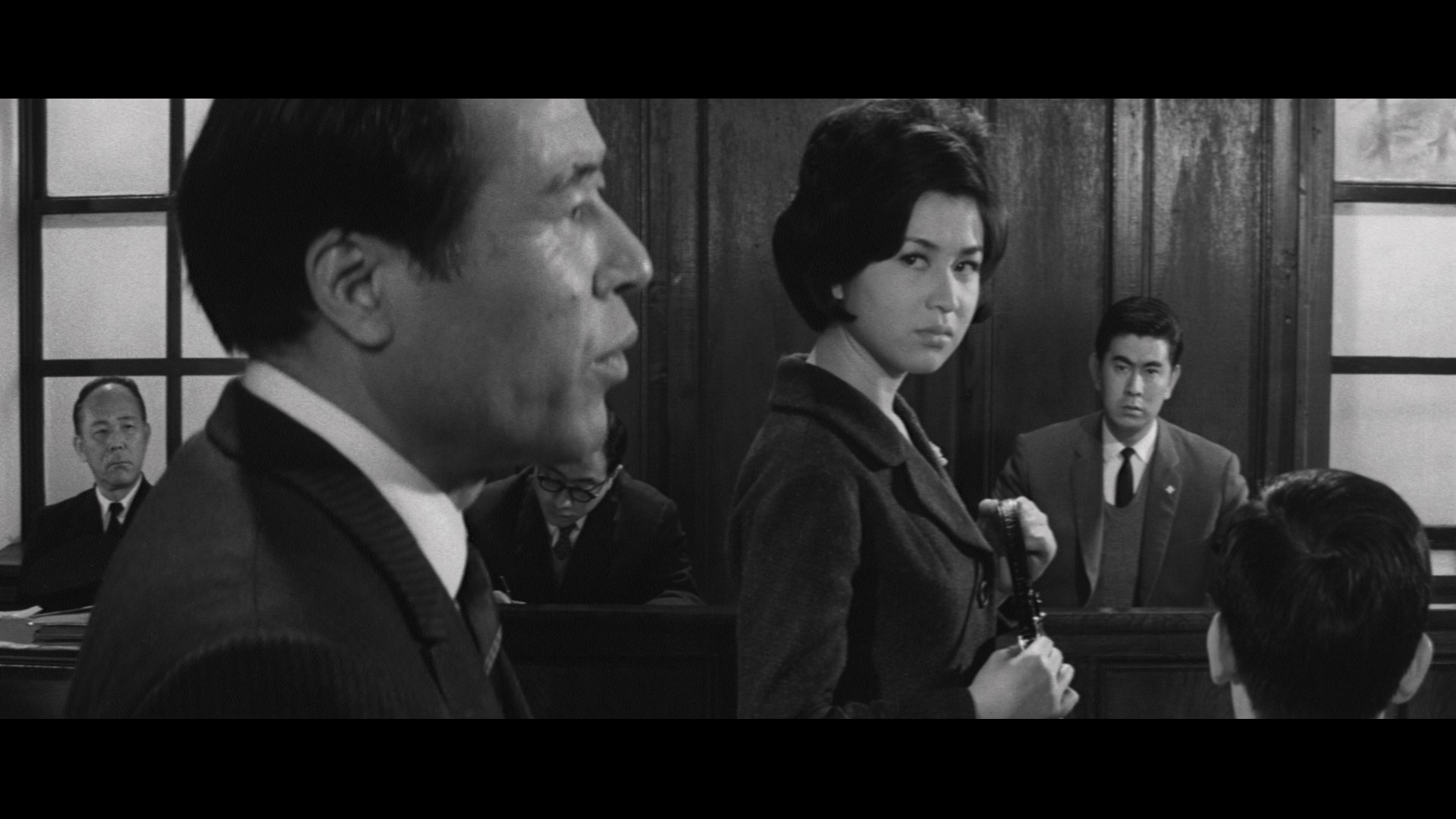 the narrative itself are being hidden from view. It's an effective device in both films that keeps them feeling fresh and intriguing today. The transfer here is about on par with the first feature; some minor element damage is in evidence at times, but it makes for a great introduction to a film that will be a first-time viewing for nearly all of its potential audience.
the narrative itself are being hidden from view. It's an effective device in both films that keeps them feeling fresh and intriguing today. The transfer here is about on par with the first feature; some minor element damage is in evidence at times, but it makes for a great introduction to a film that will be a first-time viewing for nearly all of its potential audience. ![]()